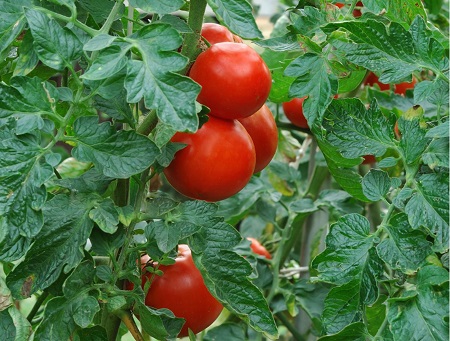By Mallory Kelley
Regional Extension Agent, Home Grounds, Gardens, Home Pests
The tomato is by far the most popular plant in the vegetable garden, but it can also be the most problematic. There are so many things to watch for when growing tomatoes to insure you have a healthy crop. I hope these tips below will help keep your plants healthy the further we go into summer.
Start with drip irrigation or hand watering only at the surface of the soil to avoid splashing. Then prune all lower limbs off the tomatoes that are touching the soil and apply mulch. Mulching your tomatoes keeps the plants moisture level consistent and will help prevent blossom end rot. Mulching helps control weeds where insects like to overwinter and eliminates there competition for the fertilizer you have applied. Mulch also creates a barrier between the plant leaves and the soil to help control many of the fungal problems that come from the surface of the ground.
Remove yellow and brown spotted leaves as soon as they appear and if not already, start a fungicide application to prevent “Early Blight.” No tomato grower can avoid this problem so apply the PREVENTATIVE fungicide before the tomatoes get the fungus. Products with the active ingredients: Chlorothalonil, mancozeb or copper will control Early Blight.
Scout daily for insects. Go out and inspect for armyworms, fruit worms, hornworms along with stinkbugs. (The main insect problems on tomatoes). Products that contain Bacillus thuringensis (Bt) will work when the WORMS are young or use products containing carbaryl if the worms are larger. Another insecticide that will control stinkbugs and some of the other pests you may find is bifenthrin. Don’t wait until your plant has no more leave before you start your search for the hornworm. Scout today cause the plant may not be there tomorrow!!!!
Weather challenges, garden insects, viral, fungal and bacterial problems, and disorders are all challenges we face with growing our own backyard tomatoes. Like I said, they are the most popular vegetable/fruit to grow, but also the most problematic. If you have more questions on what may be affecting your tomato plants and what you can do to stop it. Please call our Master Gardener Helpline at 1-877-ALA-GROW (252-4769).
 Part of the Alabama Cooperative Extension Service (ACES)
Part of the Alabama Cooperative Extension Service (ACES)
